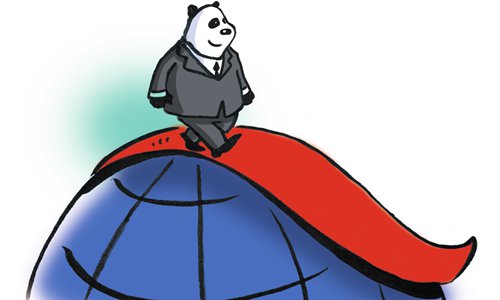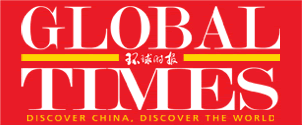Global Times
Published: 2017/11/28
http://www.globaltimes.cn/content/1077670.shtml
The overarching sentiment felt nowadays in Western capitals about the future of the world order is one of gloom and pessimism. The US, creator and main pillar of the post-World War II order, is turning inwards and currently no longer projects stability or defends globalization. Commentators bemoan the rise of non-Western powers such as China, generally suggesting that they are less committed to an open, stable and rules-based global system. As a consequence, most mainstream international affairs analysts in Washington and London today believe that for the main players in today’s global order, their best days have come and gone. The future world order – one no longer under Western rule – is generally seen as chaotic, disorienting and dangerous.
Yet one year after Donald Trump’s shocking election victory in the US, the reality looks far less grim. The system does not depend on Washington alone, and it can thrive despite the US now acting as a neutral or, in several instances, a disruptive force. Trump has not stopped globalization. Instead, globalization will march on with or without Washington, as the outcomes of recent high-level summits (such as BRICS, G20 and APEC) have demonstrated.
Many other actors, above all China, have stepped up and are now key contributors in terms of global public goods. Such contributions are not new, but ironically, it took the rise of Trump to generate greater awareness of them in the West. China, for example, has more UN peacekeepers in the field than all the other permanent members of the UN Security Council members combined. Concerning the realm of anti-piracy in the Indian Ocean, Beijing is making significant contributions through its naval forces. Unlike the US, China has not accumulated any debt with the UN over the past years, and Beijing is now the primary provider of credit for infrastructure in many regions of the world, including in Latin America, and is a leading force in institutions such as the Asian Infrastructure Investment Bank. Also, together with the European Union, China is establishing a “Green Alliance” to lead the way in the global fight against climate change.
Yet none of this should come as a surprise. Contrary to what many mainstream analysts seem to believe, rising world powers have little interest in overthrowing or disrupting the rules and norms established over the past decades. Rather, policymakers in Beijing, New Delhi and Brasília are aware of the importance of actively defending global governance and globalization, from which they have benefitted greatly.
Beijing understands that an essentiality within providing global public goods is assuring that others regard China’s rise as something positive. In this light, the strategies adopted by the US in the past and China today are quite similar. Just like Washington in the past used international institutions such as the World Bank and the IMF to project its power and draw countries into its sphere of influence, China and other non-Western powers are using their new institutions to cement their newly gained systemic centrality, strengthen economic ties with other countries, and eventually gain stronger influence in global decision-making spheres.
Like the US a century ago, China will have to get used to the enormous responsibilities that being a global superpower status entails. Given its tremendous economic importance, China will increasingly be at the center of domestic political debates around the world – be it in Peru, Poland or Pakistan. Just as the US has been conjured up in many political debates in Latin America over the past decades, China will face many demands from others, be it to mediate when domestic tensions elsewhere run high, or take a leading role in key global issues, such as climate change, terrorism or the impact of mechanization of the global job market. Embracing this new global leadership role is, without a doubt, the greatest challenge Chinese foreign policymakers face today.
A look to the past, however, reveals that China’s role as a great power is not as unprecedented as many observers describe. When asked whether China could lead, William C. Kirby, a professor at Harvard University, responded: “Yes, of course. China has led. China is home to the longest continuous civilization in world history. Chinese moral and political models defined what it meant to be civilized. Little more than 200 years ago, the Qing empire presided over the strongest, richest and most sophisticated civilization on the planet. Its economy was the largest and one of the freest in the world. (…) China survived – better than most parts of the world – the era of imperialism. China’s current ‘rise,’ as its recent growth is often described, is not simply the result of the past 35 years. It has been a century and more in the making.”
Throughout history, great powers have often sought to institutionalize and solidify their power within international norms. Based on the concept of exceptionalism, the major justification is always that maintaining hegemony is crucial to preserving stability – a line of argument currently embraced in many Western capitals. Yet fears of a post-Western order are misguided partly because the past and present systems are far less Western than generally assumed.
Non-Western powers have made important contributions to the creation of global rules and norms, often before Western actors did, and rising powers such as China are increasingly willing and capable to take the lead in providing global public goods. And while the transition to genuine multipolarity – not only economically, but also militarily and with regards to agenda-setting capacity – will be disconcerting to many, post-Western multipolarity is likely to be, in the end, far more inclusive than any previous order in global history, allowing greater levels of open dialogue, spreading of knowledge and more innovative and effective ways to address global challenges in the 21st century.
The author is an associate professor for international relations at the Getulio Vargas Foundation (FGV) in São Paulo, Brazil. His book Post-Western World has just been launched in Chinese by Beijing Mediatime.opinion@globaltimes.com.cn
Read also:
Venezuela: No Solution Without Beijing
US sanctions against Venezuela help consolidate Chinese and Russian influence in Caracas
New Development Banks as Horizontal International Bypasses: Towards a Parallel Order?










